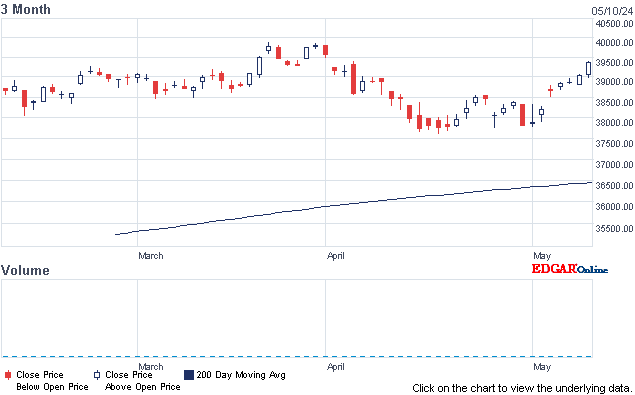Dow went up 9, advancers barely ahead of decliners & NAZ gave back 13. The MLP index rose 2+ to the 285s & the REIT index was up pennies in the 355s. Junk bond funds & Treasuries slid lower. Oil is back over 50 & gold was flattish at 1328.
AMJ (Alerian MLP Index tracking fund)

US consumer prices accelerate in Augustock
Stocks aren't doing much of anything. North Korea threats have become routine, although their reality is chilling. Rate hikes by the Fed are better understood in the stock market. The inflation report is increasing the odds for more rate hikes. The Dow is flirting around record highs with traders hoping for tax reform to improve the economy.
Dow Jones Industrials

AMJ (Alerian MLP Index tracking fund)
A North Korean state agency threatened to use nuclear weapons to "sink" Japan & reduce the US to "ashes and darkness" for supporting a UN Security Council resolution & sanctions over its latest nuclear test. The Korea Asia-Pacific Peace Committee, which handles the North's external ties and propaganda, also called for the breakup of the Security Council, which it called "a tool of evil" made up of "money-bribed" countries that move at the order of the US. "The 4 islands of the archipelago should be sunken into the sea by the nuclear bomb of Juche. Japan is no longer needed to exist near us," the committee said. Juche is the North's ruling ideology that mixes Marxism & an extreme form of go-it-alone nationalism preached by state founder Kim Il Sung, the grandfather of the current leader, Kim Jong Un. The 15-member Security Council voted unanimously on a US-drafted resolution & a new round of sanctions on Mon in response, banning North Korea's textile exports that are the 2nd largest to coal & mineral, & capping fuel supplies. The North reacted to the latest action by the Security Council, which had the backing of veto-holding China & Russia, by reiterating threats to destroy the US, Japan & South Korea. "Let's reduce the U.S. mainland into ashes and darkness. Let's vent our spite with mobilization of all retaliation means which have been prepared till now," the statement said.
N.Korea threatens to 'sink' Japan, reduce US to 'ashes and darkness'
The number of people seeking unemployment benefits declined slightly last week but still remained elevated as hurricane disruptions impacted layoffs for a 2nd week. Applications for jobless benefits dropped by 14K to a seasonally adjusted 284K last week after surging to 298K the previous week, the Labor Dept reported. The previous week's increase of 62K had pushed claims to the highest level in 2 years. The less volatile 4-week average for claims rose to 263K, the highest level in a year. Applications from Texas, recovering from Hurricane Harvey, totaled 52K, down by 12K from the previous week, but still far above the normal range of around 12K applications filed weekly. The number of Americans receiving unemployment benefits dropped 7K to 1.94M, 9.1% lower than a year ago. Economists closely watch unemployment claims, which serve as a proxy for layoffs. Even with recent increases, claims remain at levels signifying a strong labor market. Even with the disruptions from the storm, new weekly claims so far have remained below 300K for the longest stretch going back to 1970.N.Korea threatens to 'sink' Japan, reduce US to 'ashes and darkness'
US jobless benefit applications fell by 14,000 last week
US consumer prices accelerated in Aug amid a jump in the cost of gasoline & rents, signs of firming inflation that could allow further monetary policy tightening from the Federal Reserve this year. The Labor Dept said its Consumer Price Index rose 0.4 % last month after edging up 0.1% in Jul. The Aug gain as the largest in 7 months & lifted the year-on-year increase in the CPI to 1.9% from 1.7% in Jul. Economists had forecast the CPI rising 0.3% && climbing 1.8% year-on-year. Gasoline prices surged 6.3%, the biggest gain since Jan, after being unchanged in Jul. Further increases are likely in Sep after Hurricane Harvey forced temporary closures of refineries. Labor Dept officials said it was difficult to say whether Harvey impacted on gasoline prices last month. Stripping out the volatile food & energy components, consumer prices increased 0.2% in Aug, following 4 straight monthly increases of 0.1%. In the 12 months thru Aug, the core CPI increased 1.7% & the year-on-year core CPI has now increased by the same margin for 4 straight months. While Federal Reserve officials are likely to treat the gasoline-driven rise in the CPI as temporary, they could take comfort in the nearly broad gains in the monthly core CPI. The Fed's preferred inflation measure is the personal consumption expenditures (PCE) price index excluding food & energy. The annual increase in the core PCE has consistently undershot the central bank's 2% inflation target since mid-2012. The core PCE rose 1.4% in Jul, the smallest year-on-year increase since Dec 2015. Economists expect the Fed will announce a plan to start reducing its $4.5T portfolio at its Sep 19-20 policy meeting.
US consumer prices accelerate in Augustock
Dow Jones Industrials













No comments:
Post a Comment